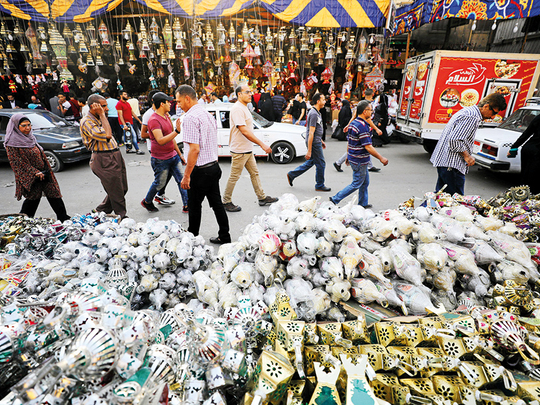
CAIRO
Ramadan is a time for daytime fasting and lavish evening feasts, but Egyptians are scaling back preparations for the Muslim holy month this year after austerity measures fuelled decades-high inflation.
At a Cairo supermarket, Rana, a web designer and mother of two, said she was buying less food in the run-up to the start of Ramadan this weekend, depending on the sighting of the crescent moon, a period that usually sees a surge in demand.
Other shoppers who gathered around fruit and vegetable stalls shared her dismay. In April, core inflation neared 33 per cent, and rose over 44 per cent for foodstuffs.
“We cut down a lot on what we buy because the prices are too high,” said Rana as she sifted through a pile of tomatoes.
The record price increases followed the government’s decision to float the pound in November — seen as a precondition for a $12 billion IMF loan — that sent the currency plummeting.
With the pound trading at around 18 to the dollar, from 8.9 before November, the price of imports and local goods that use imported components has sky rocketed.
The government also adopted a Value Added Tax and slashed fuel subsidies.
Those are measures that previous Egyptian governments would not have dared to undertake for fear of sparking unrest.
But President Abdul Fattah Al Sissi, a former army chief who ousted his Islamist predecessor Mohammad Mursi in 2013, has said he had no choice.
The measures were necessary to get the IMF financing, which provided Egypt a lifeline as foreign reserves dwindled and investors and tourists stayed out of the country that has been rocked by years of unrest.
‘Vote of confidence’
For now, Egyptians appear to be absorbing the shock, while investors are applauding the reforms.
Protesting can lead to jail by the heavy handed government, and many blame the demonstrations that ousted Hosni Mubarak in 2011 for years of chaos.
“What is coming will not be easy, but at least the shock has been absorbed. Reactions from foreign investors have been positive,” said Ramy Orabi, an economist with Pharos Holding for Financial Investments.
The International Monetary Fund, which views the reforms so far as successful, said this month it would release the second tranche of the loan in a “vote of confidence”.
Ratings agency Standard and Poor’s said it anticipated “ongoing fiscal consolidation in Egypt over 2017-2020, supported by the three-year IMF programme”, affirming Egypt’s B-/B foreign and local currency sovereign credit rating.
But the IMF has also signalled concern over inflation, with one official suggesting an interest rate hike to tamp down inflation.
Monthly inflation fell from 4.3 per cent in January to 1.8 per cent in April.
“The monthly inflation increase is falling, and the floated currency and rising fuel prices reached a climax and should now return to a normal rhythm,” Orabi said.
The Monetary Policy Committee raised on Sunday the benchmark overnight deposit rate to 16.75 per cent, and the overnight lending rate to 17.75 per cent, each by 2 percentage points.
Floating the pound reduced the trade deficit, with importers of essential goods given priority access to dollars, in a country that buys even its wheat from abroad.
In February, the deficit fell by 56 per cent compared with the same month last year.
The government has also sought to encourage direct foreign investment with a new law and tax exemptions, with results expected by the end of 2017.
Investments had already begun to edge back towards the pre-2011 level of $13.2 billion.
Between July and December 2016, direct foreign investment reached $7,4 billion, according to the central bank, compared to $6.9 billion the previous fiscal year.
Standard and Poor’s is forecasting a growth rate of 4 per cent over the next three years, spurred by investment and exports.












